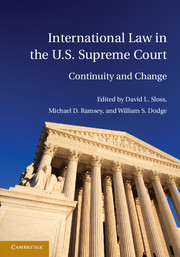Book contents
- Frontmatter
- Contents
- List of Contributors
- Table of Cases
- Acknowledgments
- Introduction
- PART I FROM THE FOUNDING TO THE CIVIL WAR
- PART II FROM THE CIVIL WAR TO THE TURN OF THE CENTURY
- PART III FROM THE TURN OF THE CENTURY TO WORLD WAR II
- 6 Treaties in the Supreme Court, 1901–1945
- 7 Customary International Law in the Supreme Court, 1901–1945
- 8 International Law as an Interpretive Tool in the Supreme Court, 1901–1945
- 9 Varieties and Complexities of Doctrinal Change: Historical Commentary, 1901–1945
- PART IV FROM WORLD WAR II TO THE NEW MILLENNIUM
- PART V INTERNATIONAL LAW IN THE U.S. SUPREME COURT IN THE TWENTY-FIRST CENTURY
- V.A TREATIES AFTER 2000
- V.B CUSTOMARY INTERNATIONAL LAW AFTER 2000
- V.C INTERNATIONAL LAW AND CONSTITUTIONAL INTERPRETATION AFTER 2000
- V.D INTERNATIONAL LAW AND STATUTORY INTERPRETATION AFTER 2000
- V.E INTERNATIONAL LAW AND THE WAR ON TERROR
- VI CONCLUSION
- Index
- References
9 - Varieties and Complexities of Doctrinal Change: Historical Commentary, 1901–1945
Published online by Cambridge University Press: 05 July 2011
- Frontmatter
- Contents
- List of Contributors
- Table of Cases
- Acknowledgments
- Introduction
- PART I FROM THE FOUNDING TO THE CIVIL WAR
- PART II FROM THE CIVIL WAR TO THE TURN OF THE CENTURY
- PART III FROM THE TURN OF THE CENTURY TO WORLD WAR II
- 6 Treaties in the Supreme Court, 1901–1945
- 7 Customary International Law in the Supreme Court, 1901–1945
- 8 International Law as an Interpretive Tool in the Supreme Court, 1901–1945
- 9 Varieties and Complexities of Doctrinal Change: Historical Commentary, 1901–1945
- PART IV FROM WORLD WAR II TO THE NEW MILLENNIUM
- PART V INTERNATIONAL LAW IN THE U.S. SUPREME COURT IN THE TWENTY-FIRST CENTURY
- V.A TREATIES AFTER 2000
- V.B CUSTOMARY INTERNATIONAL LAW AFTER 2000
- V.C INTERNATIONAL LAW AND CONSTITUTIONAL INTERPRETATION AFTER 2000
- V.D INTERNATIONAL LAW AND STATUTORY INTERPRETATION AFTER 2000
- V.E INTERNATIONAL LAW AND THE WAR ON TERROR
- VI CONCLUSION
- Index
- References
Summary
The preceding three fine chapters in Part III not only advance our understanding of international law developments in the United States but also suggest the challenges that confront scholars in the field. Although focused on the Supreme Court, they nonetheless suggest the sprawling scope of their subject and the complex interrelationships – institutional, intellectual, cultural, economic, and political – that often entangle and perplex both legal and historical analysis. By carefully identifying central issues and tracing major developments, the chapters illuminate the past and suggest important directions for future scholarship.
This review chapter proceeds in four parts. The first three examine the contributions of the chapters in this section, while the fourth explores three basic themes that run through much of the book. Those themes are hardly the only ones that merit discussion, but each seems central to the history of international law in the late nineteenth and early twentieth centuries.
The Law of Treaties
Professor Michael Van Alstine's essay introduces the period from 1901 to 1945 as one of paradox. Although vast social and political forces “propelled a substantial change in the domestic law,” he explains, the law of treaties was marked “not by headstrong change, but rather by a sense of continuity, consolidation, and completion.” While the numbers and types of treaties expanded rapidly in the early twentieth century, the Court “repeatedly reaffirmed the foundational principles of treaty law,” including the duty of courts to apply treaties as controlling law, the “last-in-time” rule, the law of territorial acquisition, and the right of the President to determine the nation's treaty partners.
- Type
- Chapter
- Information
- International Law in the U.S. Supreme Court , pp. 285 - 314Publisher: Cambridge University PressPrint publication year: 2011



